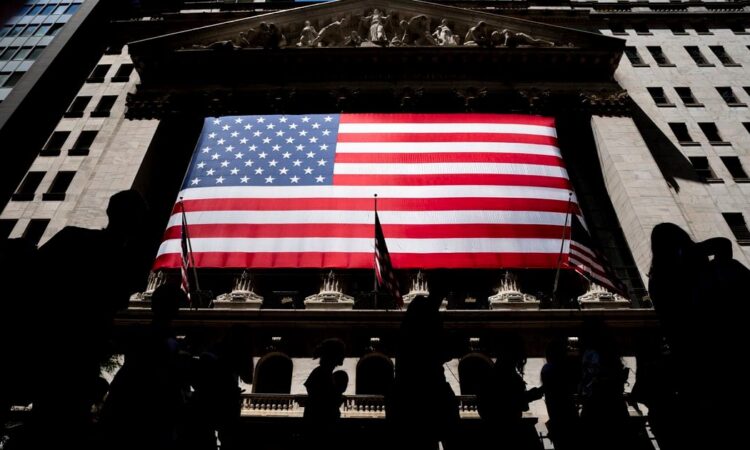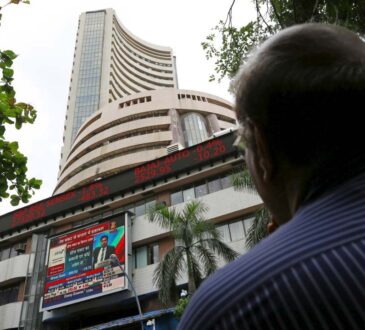
Futures for the Dow Jones Industrial Average ticked up 0.1%, and futures for the S&P 500 gained 0.7% and the technology-heavy Nasdaq shot up 1.1%. All were on track to finish the week with gains, a surprising development considering Wednesday’s swoon.
Thursday on Wall Street, U.S. stocks rebounded widely following their worst day since September.
Expectations are that the Federal Reserve will begin cutting interest rates in May, after pushing back expectations from March. Whenever rates do fall, it would mark a sharp turnaround after the Fed hiked its main interest rate to the highest level since 2001 in hopes of getting inflation under control.
High interest rates intentionally slow the economy and they undercut investments, particularly tech stocks.
Amazon jumped more than 7% in off hours trading after the online retail behemoth reported better-than-expected revenue and profits for the fourth quarter, driven by what Amazon CEO Andy Jassy called a “record-breaking” holiday shopping season.
Meta Platforms, the parent company of Facebook, climbed nearly 17% after the bell Thursday when it reported tripling its profit on sharply higher revenue. Meta was boosted by a rebound in digital advertising as well cost cutting and layoffs in what CEO Mark Zuckerberg called the “year of efficiency.”
Apple was the most notable laggard, falling 3% even as it latest financial results revealed that the iPhone maker snapped out of a year-long sales slump.
Later Friday, the government issues its first jobs report of 2024. Economists expect that hiring slowed but that the economy still added 177,000 jobs, down slightly from December but still a solid number signaling a strong economy.
Elsewhere, The Shanghai Composite index ended 1.5% lower at 2,730.15, capping its worst week of losses in five years. Hong Kong’s Hang Seng shed 0.2%, to 15,533.56, as gains for technology companies offset declines in property shares.
Shanghai’s benchmark saw wild swings on worries over the economic outlook and other risks.
At one point, the Shanghai index dropped below 2,700, to 2,666.74, prompting a flood of social media comments in China, including one commentator who exclaimed, “now we’re all sitting ducks.” The benchmark is down nearly 17% in the past year and 9.3% in the past 3 months.
Analysts said the sell-off was at least partly sparked by so-called “snowball derivatives” that yield high returns on gains but likewise cause big losses when share prices fall. Selling of biotech companies was also heavy on concern over a possible U.S. move to impose controls on dealings with Chinese companies like WuXi AppTec, whose shares dropped 21%.
Also undermining confidence was a report by the International Monetary Fund, which forecast that the Chinese economy would grow at a 4.6% pace this year and 4% in 2025, dropping from 5.2% last year.
In early European trading at midday, France’s CAC 40 advanced 0.7%, while Germany’s DAX rose 0.8%. Britain’s FTSE 100 gained 0.5%.
Japan’s benchmark Nikkei 225 added 0.4% to finish at 36,158.02. Aozora Bank’s shares plunged nearly 16% after it reported losses on its U.S. property investments. On Thursday, the bank’s shares dived 27.4 percent. The lender attributed its losses to high interest rates and a weaker commercial property market during and after the pandemic, as companies switched to hybrid or remote working arrangements.
The Japanese bank’s woes are similar to those of New York Community Bancorp whose shares have fallen by more than 40% this week after it reported a loss for its latest quarter and cut its dividend to build its financial strength. New York Community Bancorp acquired much of Signature Bank last year after it and other regional banks collapsed and its losses reflect problems for the entire industry.
Elsewhere in Asia, Australia’s S&P/ASX 200 jumped 1.5% to 7,699.40. South Korea’s Kospi surged 2.9% to 2,615.31 after the country reported strong export data.
In energy trading, benchmark U.S. crude inched back 5 cents to $73.77 a barrel in electronic trading on the New York Mercantile Exchange. Brent crude, the international standard, lost 3 cents to $78.67 a barrel.
Exxon Mobil and Chevron are mixed in early trading after posting quarterly earns. Big oil continues garner massive profits despite falling crude prices.
In currency trading, the U.S. dollar was little changed at 146.60 Japanese yen, up from 146.43 yen. The euro cost $1.0880, up from $1.0874.
——

